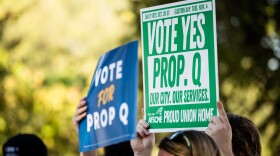Austin voters soundly rejected Proposition Q, the controversial city-backed plan to raise more than $100 million in property tax revenue to pay for homeless services and other city projects.
Taken at face value, the measure was simple: It asked Austinites to voluntarily increase their city property tax bills to pay for what the city deemed essential services. But that was a tall order for some.
The measure was a lightning rod in a typically sleepy off-year election cycle, with more than 100,000 voters casting ballots on Election Day alone.
Now, Prop Q's failure could push the Austin City Council to temper its spending habits.
Save Austin Now, the primary political opponent of the measure, organized a broad coalition of Austin voters to reject Prop Q. The political action committee argued it would make Austin less affordable for property owners, workers, renters and businesses.
At a campaign watch party Tuesday night, Austin attorney Adam Loewy, who gave $10,000 to the campaign and donated a billboard to Save Austin Now, said the measure's failure proves "enough is enough" and that citizens want City Council members to pare back spending. Loewy cited recent expenses on a $1.1 million logo and recent trips abroad by council members, among other costs.
"The spending must stop. We do not need more taxes, and this City Council needs to get the message to get their house in order," he said. "Quit with the million dollar logos. Quit with the trips to Japan. Quit with wasting the taxpayer money."
Mayor Kirk Watson agreed, to a point, saying council members "need to give voters reason to trust us." Watson said the rejection is a clear mandate to reexamine the costs and needs of city-funded programs.
"We should meet the voters’ mandate with a coherent, straightforward budget process that focuses on basic services and basic budgeting," he said in a statement Tuesday. "At a time when people are losing faith in all levels of government, including local government, as evidenced by the election outcome, our city government needs to show it can act in a thoughtful, structured way."
Council Member Marc Duchen, the lone vote against the tax rate election plan, said in a statement that the rejection was "a referendum on trust" and echoed Watson's call for a clear-headed appraisal of spending at City Hall.
"My colleagues and I have an opportunity to restore our constituents’ faith in local government, and I hope we seize it," he said.
Prop Q's failure wasn't a complete shock to City Hall. City Manager T.C. Broadnax initially proposed two options for a budget in August: one that would work without a voter-backed tax increase and another budget accounting for revenue generated by Prop Q.
Watson said Tuesday the Austin City Council would take another look at that initial budget and he anticipates "that should be done soon." Watson also suggested the council take a harder look at Austin's spending habits.
Duchen agreed, pointing to efforts in Houston to study possible reductions in spending and rein in overall costs amid its $330-million budget gap earlier this year.
The District 10 council member pushed for a similar study when Austin's budget passed in August. Now that Prop Q's failed, Duchen said a top-to-bottom look at spending would address "structural" issues and "ensure we spend as wisely as possible.”







